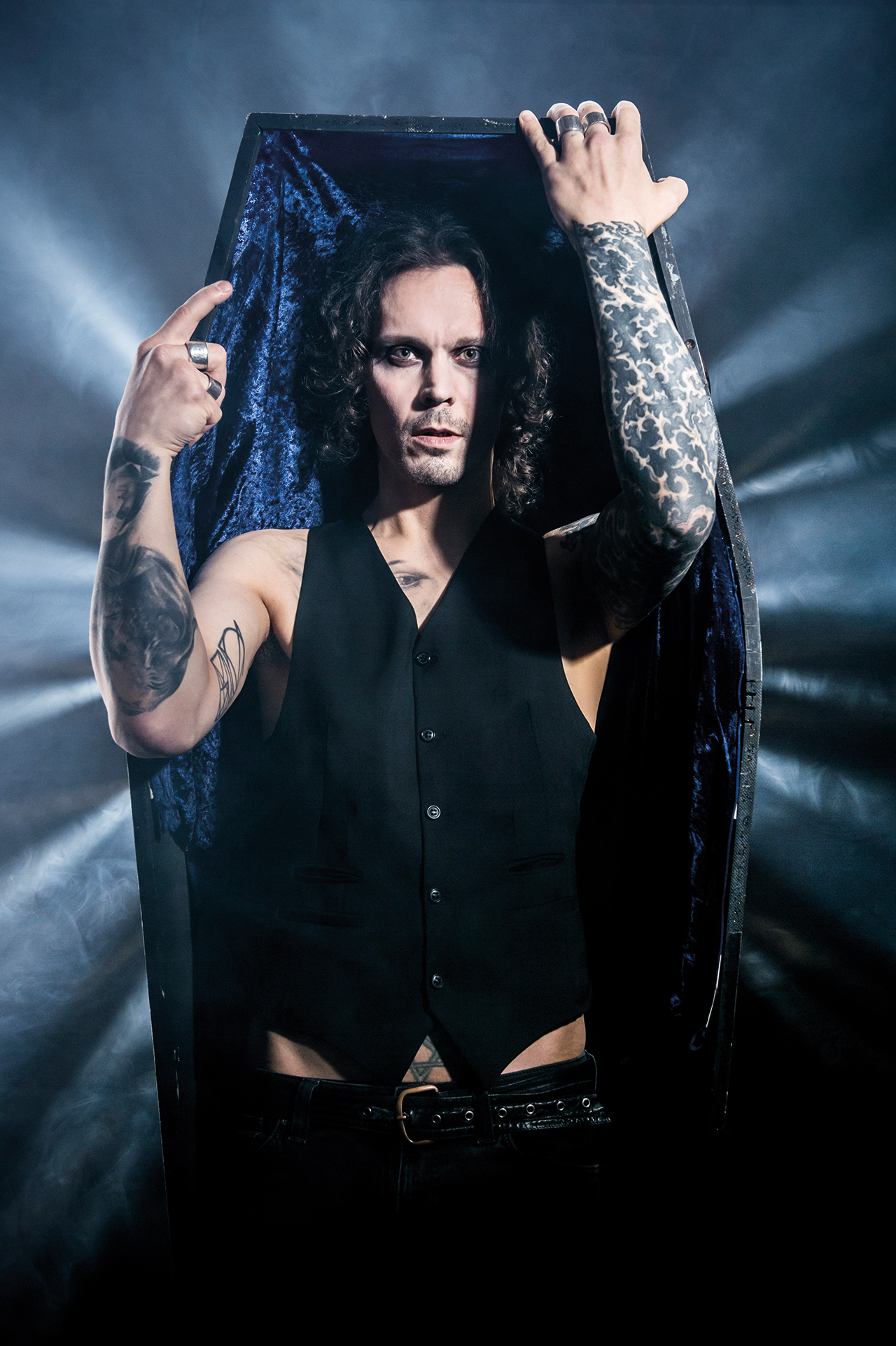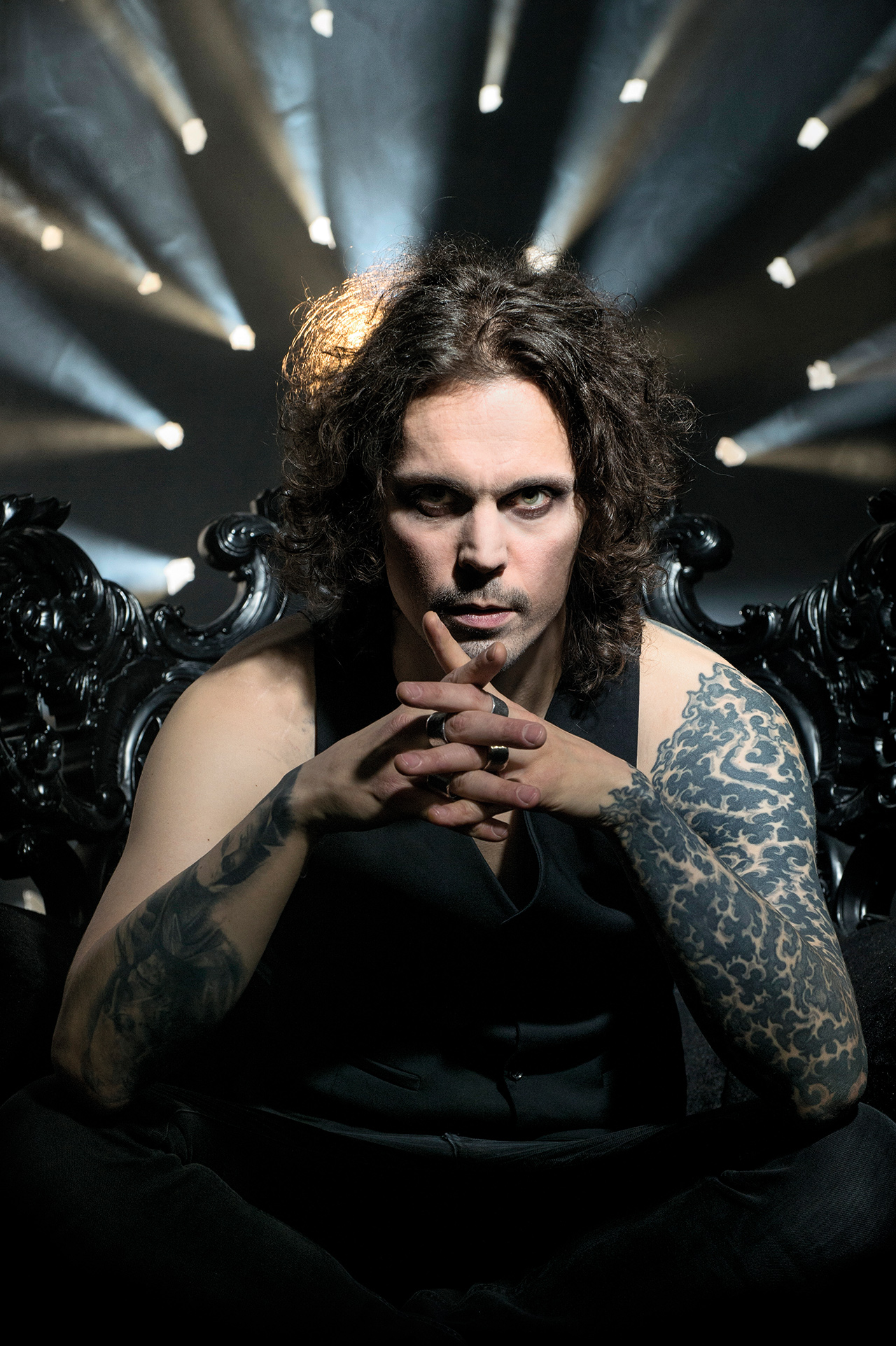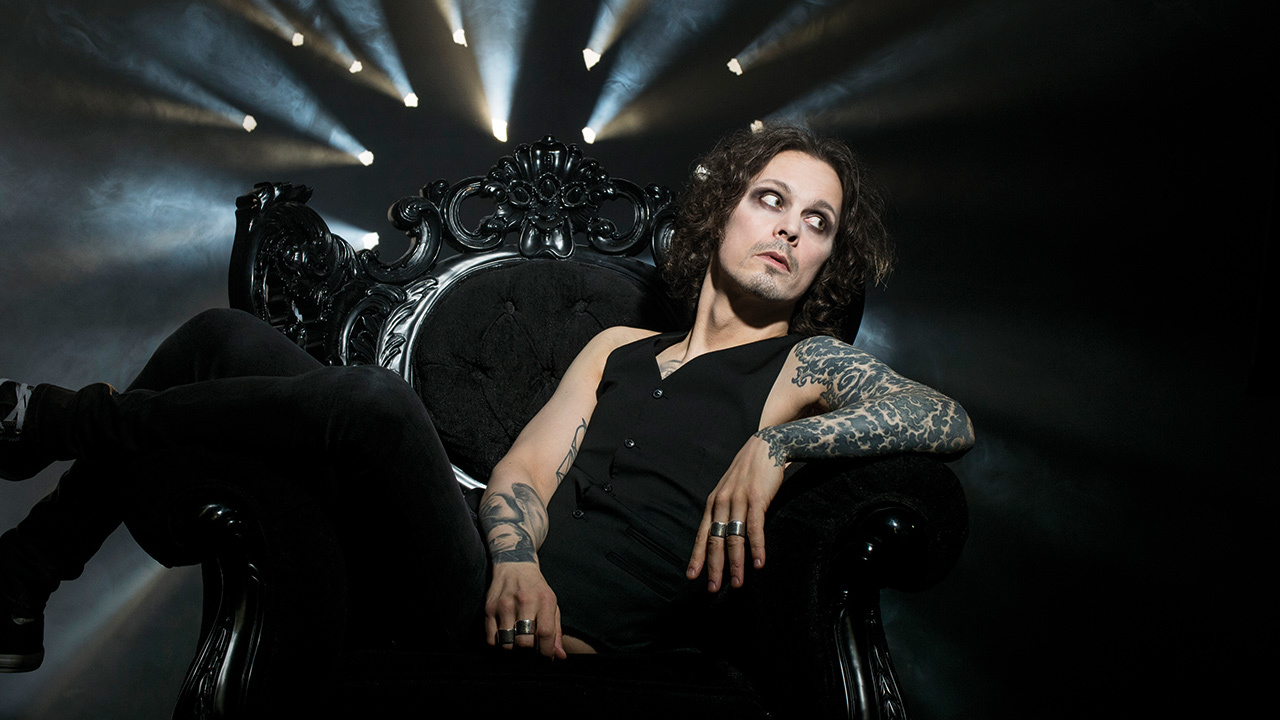HIM is dead and vocalist Ville Valo is about to reveal why. It’s mid-afternoon on a Monday in October and all eyes in the country are turned towards the sky.
Hurricane Ophelia, one of the most colossal and potentially violent weather systems to emerge in these parts for 30 years, is slowly, inexorably amassing power above the UK with one peculiar side-effect. Vast amounts of desert sand suctioned up from the Sahara has intermingled with the low-flying clouds to turn the sky a deep orange, and – as confirmed by tens of thousands of pictures appearing on social media – the sun is currently blood red. We’ve been assured that Hell hasn’t opened, but it’s as if someone’s added an Apocalypse filter to the UK and it’s hard not to imagine that if the world really was going up in flames it might look just a little bit like this – and with everyone Instagramming it as it happens.
It’s a fitting scene, because at this very moment at Murder Mile Studios, deep in the bowels of Walthamstow in East London, there’s a world that really is coming to an end. Photographer John McMurtrie is currently taking what could be Metal Hammer magazine’s last ever pictures of Ville Hermanni Valo: a man who, as the founding frontman, visionary and creative force behind His Infernal Majesty, has graced these pages more times than this 31-year-old publication could easily count.
To say he’s been a giant in our world would be understating the case, because nearly 20 years to the day that HIM’s debut arose out of the Finnish rock scene and went platinum there, Ville Valo has proved himself more than a mere musician. The wry gloom of his outlook and his flair for a dramatic turn of phrase have established him as a formidable songwriter, but it’s his inimitably gothic style, his comfort with the lens, the studied way in which he expresses himself – his personification of the Heartagram – that have long since established him as one of his generation’s last, true icons. If HIM have endured then it’s because the man at the helm hasn’t just captured hearts and imaginations the world over. It’s because he’s interesting. It’s because Ville Valo is an original.
And then there’s the music: heavy as wrought- iron, unabashedly romantic, and resolutely Black Sabbath-ian while embracing the poppier sensibilities and emotional earnestness of the 80s goth movement, HIM didn’t just record songs; they built a world around themselves which Ville has presided over for a staggering 26 years. Now, like an indifferent god, he wants nothing more to do with it.
The news of HIM’s dissolution came via a cryptic message on the band’s Facebook page on March 5. It followed a protracted period of inactivity, which itself followed the departure of drummer Gas Lipstick after 16 years back in 2015, but it was a shock nonetheless. It read:
‘After quarter of a century [sic] of Love and Metal intertwined we sincerely feel HIM has run its unnatural course and adieus must be said in order to make way for sights, scents and sounds yet unexplored. We completed the pattern, solved the puzzle and turned the key. Thank you.’
Coming from a band that has been such a creative constant, it left both industry and fans alike scratching their heads and wondering if their final tour would yield answers to the burning question: what the hell happened?
The shoot draws to a close, Ville draping himself over furniture and pulling faces for the camera with the confidence of someone who’s done this many, many times before. As ever, the lithe Finn immediately wants to see the results as they are taken – he’s always been a careful curator of how he’s portrayed. For a man about to turn 41 he’s looking pretty good, too – possibly healthier than he’s been in a long time. He’s off booze and cigarettes, he says – a breathtaking achievement for someone who used to light up so compulsively he’d have sucked down two at a time if he had another mouth, and for whom arriving at interviews with a sack of beers was a common occurrence. He says he wants to be in fighting shape for the final tour, and he’s as matter-of-fact about HIM’s conclusion as most people are about a trip to the shops.
“What shall we talk about?” he says, grinning.
Let’s start with who dumped who.
“Let’s just say I fired myself from the band,” he says, clearly proud of how clever he is, and with that, HIM’s final chapter begins. We say our goodbyes to the folks at the studio and stroll back to my place down the road, marvelling at how pretty the end of the world is.

When HIM first appeared on the scene, heavy music was redefining itself. It was the 90s, and the Big 4 of thrash and the lumbering gods that had preceded them had given way to myriad new forms of extremity, hybridisation and uncharted progressive territory. What made HIM so special wasn’t that their forlorn sound was so different from any of these things, but that it was so unapologetically heartfelt, and its sentimental enchantments spoke to people in a way that few other bands did. You could see it at the gigs: the sweaty fervour, the all-day queues, the lyrics being sung back at the barricades. There was a whiff of Beatlemania in the air – not just after the shows but in the way fans seemed to follow Ville’s every movement and, as countless online fan forums suggested, hang on his every word. Following the release and rapturous response to Love Metal in 2003, the Heartagram – drawn by Ville’s own hand – started appearing everywhere: on shirts, on jackets, on skin and, finally, on massive backdrops as the venues grew and their fame reached ever-more dizzying heights with the records and endless touring that followed. There were other effects, too – months, even years of exhaustion, isolation, heartbreaks, fuck-ups, alcohol abuse and all the side-effects of success that nobody ever warns you about.
We’re sitting in a dimly lit room now, reflecting on times gone by and admiring the low-flying clouds as they tumble through the colour-saturated sky outside to the sound of whistling wind. A wolf howls… OK, just kidding.
So what happened?
“The tickle just wasn’t there anymore,” he says after a moment of reflection, carefully choosing his words. Outside of a tight circle of friends and family, this is the first time he’s spoken about the demise of a band he founded in Nineteen. Ninety. One. Given the gravity of it all, he seems surprisingly casual about it.
“When we came back and did Tears On Tape in 2013, we’d been having some tough times – with the labels, blah blah, all the stuff bands go through. But a band has to be strong, and the friendship has to be strong so you can concentrate on the essentials like drinking beer and shaking your bum.”
Changing industry times and a mixed reaction to HIM’s eighth album certainly didn’t help matters, either. While an arguably solid follow-up to 2010’s Screamworks, Tears On Tape somehow failed to set the world alight, and the Finnish stalwarts suffered a further blow when drummer Gas Lipstick quit in 2015, citing a desire for new horizons.
“We started working on Tears On Tape and that’s when his arm started malfunctioning,” says Ville. “He healed up and everyone was super-happy, but after we were done with two tours he decided he was done, too. We were unsure of what to do next. I was the guy who forcefully tried to get us a new drummer and try one last time.”
The band would recruit Jukka ‘Kosmo’ Kröger and make a surprise appearance with the new lineup in Oulu, Finland in summer 2015, and would – as Ville stated – begin work on a new album in 2016. And then nothing happened.
“We did a couple of gigs with the new drummer and we tried jamming maybe two new songs, but it sounded like shit. People’s hearts weren’t into it. It’s not because all is said and done. We know each other really well – everybody’s really looking forward to this tour, because it’s nostalgic and it’s our last trek through the HIM universe, but that’s why I wanted us to call this a day as a band, because I could only see it getting worse…”
…you wanted to end it while you were still friends.
“If possible, yeah, but we still have time to become enemies on this tour! Ha ha ha! We’re still cracking jokes – all that great stuff is there, but the creative spirit, the need to… ah, what’s the word… Fuck it, I haven’t been speaking English in ages. The need to be successful…”
Ambition?
“Yeah, that. I felt the whole band were lacking ambition. I do find myself a wanky self-centred artist in that I have to be excited about what I do; I need this ‘giddy 15-year-old’ feeling. In today’s terms, it needs to resonate. I don’t want to waste my energy. I need to follow my heart and do what’s right for me. I don’t want to name bands, but I don’t want to be 55 and still playing Wicked Game exactly how it ever was. The crowds are fantastic, but I don’t want simple repetition. Maybe that’s the golden cage dilemma – it’s beautiful, but it’s still a cage.”
If Ville sounds angry here, then rest assured he isn’t – the raft of motions and the release that comes with one of the biggest decisions of his life have long since been processed, and he’s emphatic about the good-natured vibe surrounding the split.
“We really thought about this long and hard. [Guitarist] Linde Lindstrom and I have known each other since we were seven. We’ve been playing since 11, and we formed the first version of HIM in 1991. What I always liked in the late 90s, the early 2000s, was it was a band of brothers, bandidos, fighting for each other, living in a shitty house together. I’m a romantic like that, but I had to give in. That’s bittersweet – being on your last legs and admitting that it’s not enough. I always hoped there’d be one album that’d change things for the better. Tears On Tape was a great moment for us but people didn’t like it. It was the time to prove people wrong, but we ran out of juice and then Gas left the band at the moment we should have been d’Artagnan and the Three Musketeers, or five. In the face of adversity some people become stronger. That’s what I was hoping for.”
He pauses there, the disappointment heavy in his voice. He exhales. He shrugs.
“Instead it just separated people.”

It was a whimper and not a bang that finally finished it. On a cold night in February of 2017, the current lineup of HIM gathered at a pub near their Helsinki rehearsal room and decided to conclude a 26-year engagement that had resulted in countless tours and more than ten million records sold. A band meeting had been called but a decision had already been made. He’d spoken with Mige ahead of the event – Ville confesses Mige was a sparring partner through the process and helped him rationalise what was happening – and they opted for common ground, “so people could have a drink and calm the nerves”.
“The clichés turned out to be true,” he admits. “The thrill is not gone, but it’s gone somewhere else. Talking about the weather with the guys, or discussing old songs? No change there, but when it came to talking about the future we saw very different things, or nothing. Everyone was silent and Mige and me did most of the talking.”
He reveals little as to the tenor of the conversation, but he describes it as a “duologue”, with just him and Mige doing the talking and the rest of them sitting in silence. It was a sombre occasion, but you get the sense that it was also expected.
“I think maybe the first time Linde called me in eight years was when he called me to ask if I really thought it was a good idea,” he says. “There were no tears. I think they’ll come on New Year’s Eve when we play our final show. I’m saddened, but I’m so happy about the 25 or 26 years we had. It’s pretty marvellous, a once-in-a-lifetime thing. I said to the guys, ‘You never know what’s going to happen, but there’s a reason for us doing this now.’ We might have done this 10 years earlier but that’s a Finnish thing, wanting to reach the logical end. I’m a little sad we didn’t blow up, though – maybe I wanted it all to be more dramatic,” he finishes, letting out his trademark, vampiric giggle.
And that isn’t to say that HIM didn’t come close to implosion. Ville Valo’s story wouldn’t be so remarkable if it wasn’t so unlikely, and close observers might agree that of all the possible ways HIM may have come to an end, an amicable agreement and a farewell tour is probably the best possible outcome because Ville Valo survived. As someone who once interrupted an interview with yours truly, leaned in, and explained it was on account of shitting blood, that’s saying something.
He’s contemplative and anything but morose when we discuss the highs and lows of his career to date – the odd trappings of fame and fortune, his critical and commercial successes, the whole weird trip he’s been on, but he draws a blank when it comes to rock bottom. He frequently refers to the time after 2000’s Razorblade Romance as his decade of dementia, but it’s common knowledge that he’s been close to the brink once or twice in that time, particularly following the recording of 2007’s Venus Doom and his entering into Promises, a renowned Los Angeles rehabilitation clinic, after blacking out and being discovered dehydrated and near death by his manager, Seppo.
He’s been close to the edge.
“But I don’t even like U2,” he says, smirking. “Your lowest point isn’t when you’re out of your head, it’s when you’re trying to come back when you feel the most vulnerable and it hits you – ‘Where have I been, what have I done?’ You feel like a bare-bottomed baby.”
Is that how you felt after rehab?
“Maybe that, too. It’s the eye of the storm – you see things are happening, good or bad, but you have no idea of the scale. The zenith for me was the ridiculous amount of energy and adrenaline when we went to the States for the first time with Dark Light. It wasn’t just alcohol – it was a kid who’d never been anywhere suddenly travelling nine months out of the year, speaking a foreign language, maybe being a bit shy and drinking because that made communicating to people easier. It’s like a psychological experiment, throwing someone into that. I’m not a victim – I was a willing guinea pig in the great laboratory of rock and roll. Ha ha ha! It was a mini-life – I was born out of the womb of rock’n’roll and ended up in hospice care. It was a decade of Benjamin Buttonism…”
As Ville recalls, it was during the lead-in to Venus Doom in 2007 that the ride got scary. He’d suffered a bad relationship and the 24/7 nature of it all began to take a serious toll.
“It was maybe a reaction to the hedonism of Dark Light, the American rock moment. I was depressed and if nobody’s telling you to stop then shit’s gonna break,” he says. “The work never stops and it’s very hard for you to say no because the next step could be The One, so you do all the dinners with important people, you chase the rainbow, but when does it end?”
If Venus Doom was the crystallisation of Ville’s darkest point, then 2010’s Screamworks: Love In Theory And Practice was when the pendulum swung too far the other way. It was, he relates, the first album he did completely sober, and he had to relearn the songwriting process in order to make it work.
“I think I became very OCD. It happens to a lot of people – you stop drinking and you want to prove to the world you’re way better off. You can overdo that. When I think about it we could have ended it then, but we’ve always been bad at taking no for an answer.”

And that brings us back up to the present day and the burning question of what’s next. Most pressing is the farewell tour – a victory lap and what Ville’s describing as a fond farewell. The decision by HIM to head out for a slew of shows wasn’t immediately unanimous, but after some convincing the group decided to hit the road one last time, both as an acknowledgement of what they’ve achieved together and to raise the proverbial glass to the fans who’ve supported them along the way.
“It’s been an amazing journey and I really mean that,” he says. “It’s also like the first time I can really appreciate what we’ve done because I won’t be worrying about what happens next. It’ll be cool to sing Join Me In Death because I can think how far it’s brought us; I don’t have to think about the next album because there isn’t going to be one, and as an entity HIM deserves the respect, and maybe we need to do this so people can understand it really is over and so we can close that door.”
That leaves the question of what you’re going to do when the final note has been played…
“I’m going to pick up a guitar,” he says. It’s too soon to tell exactly what he has in mind, but Ville has no intention of riding off into the sunset. “At the end of the day I did write 90% of the songs. I’m going to continue writing songs.”
There’s a giddiness in his voice when he describes the prospect of stepping outside of the Heartagram’s shadow and redefining expectations and stepping out of his comfort zone. He’ll admit to feeling that HIM had grown stagnant from inactivity, and he’s eager to change that.
Are you going solo?
“I don’t know what’s going to happen next,” he says, and he sounds like he means it. “To feel better and to not be a depressed cunt you need to do something about it. I’ve picked up the guitar many a time and written songs for HIM that were never rehearsed because of the un-enthusiasm we felt for the collective work, and I just don’t want to be working on it right now. HIM needs to get out of the way for me to start afresh, and it’s going to be nice to let the songs lead the way. I don’t know if it’ll be post black-metal shoegaze stuff or not…:”
Does that mean you have music written?
“Yes, I have bits and bobs – I’m not sure if they’re good enough. But I like them. When I’m feeling down, I write music, it’s my musical meditation. It takes me away and it creates a world and this time around I’m creating a world where I can pick all the colours for it. I think it’s gonna be more artsy. I’ve always loved Sonic Youth and I always loved Dinosaur Jr. and Nirvana – those messy guitars. We always came more from Metallica’s world with HIM, but I love Smashing Pumpkins, too, or The Jesus And Mary Chain. It doesn’t mean anything – I don’t know if it’s gonna be reggae – and I don’t care. All I can do is write a few ditties and see how life works, and maybe I just need to stick a couple of new holes in my belt and eat a bit less rice every day, but I like the challenge. I’m a good problem solver. I miss the danger and the uncertainty…”
It seems it’s too soon for Ville to fuel speculation, or to give an elusive and unfamiliar dream too much form. Much of what he’s said about recent events has been framed in the context of relationships, and it appears he needs closure before he can comfortably embark on anything new, though he leaves no doubt as to the prospect of new music and new adventures. First, he and his bandmates have one last rites to perform – one final encore before the curtains go down on His Infernal Majesty so they can bid their fans adieu.
“Hopefully they’ll appreciate it,” he says. “It’s not saying goodbye, it’s about saying thank you – thank you so much for having us. Hopefully we didn’t overstay our welcome.”
And with that we click off the recorder and stroll off into the night – it’s time for Ville to set off for LA and what seems a joyously uncertain future. The sky is clear now, the storm has passed. It’s too dark to tell, but as he disappears down the stairs of the Tube, it’s easy to imagine he’s smiling.
The best 10 obscure '90s goth songs, by Ville Valo

